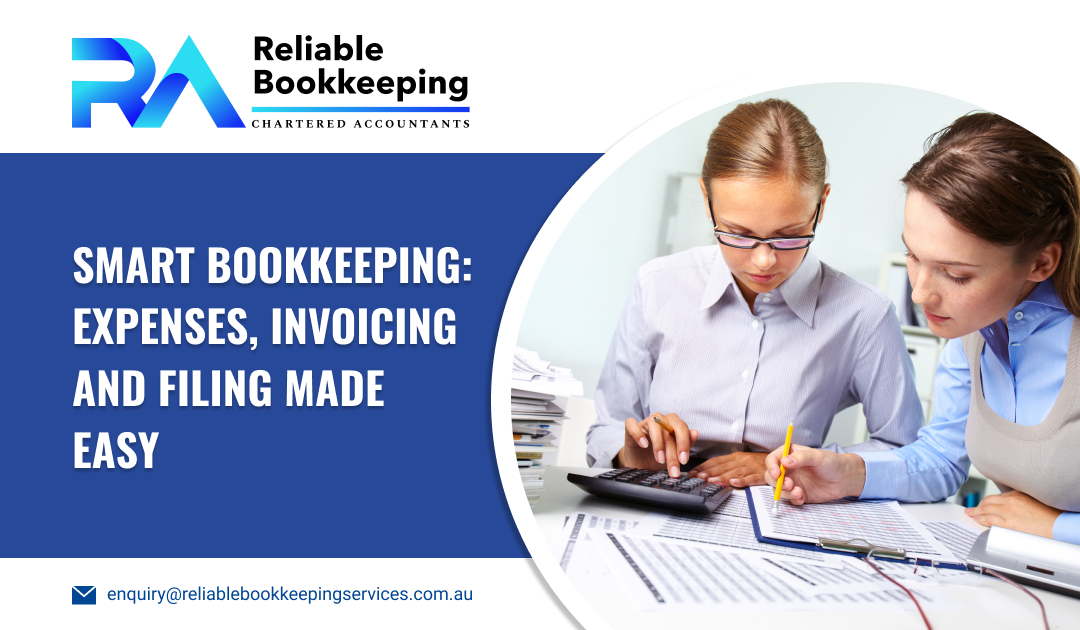Do you need help keeping track of your invoices, expenses, and filings? You are not alone. Bookkeeping can be overwhelming for many small business owners, but by seeking help from a small business bookkeeper, you will get your business books ready on time. Many bookkeepers are available to help you improve your bookkeeping practices. You can get advice from bookkeepers regarding invoicing and other essential topics. In this blog post, we’ll provide you with basic bookkeeping tips, including how to track invoicing, your business expenses, and tax return lodgment.
Tips for Record-Keeping for Small Businesses
Maintaining accurate records is crucial to the success of any small business, whether you are just getting started or have been operating for years. Bookkeeping is about keeping track of your expenses and documenting all financial transactions. For small business owners, monitoring expenses is especially important, as costs can fluctuate significantly based on your industry, the season, consumer demand, liabilities, and the specific products or services you provide.
There are various methods for managing your books, but the key is to choose an approach that aligns with your business’s specific needs.
- One useful practice is to use accounting software, which can streamline record-keeping by organising financial data into spreadsheets or other easy-to-navigate formats.
- Another important habit is keeping your invoicing up to date to ensure timely payments of any outstanding bills or obligations.
- By maintaining a consistent bookkeeping system, you can gain better control over your finances and create a solid foundation for your business’s long-term stability.
Tracking Expenses: What Should You Keep?
Whether you are a small business owner or running an established business, keeping track of your business expenses is crucial. You must keep detailed records of your business transactions to understand where you are spending money. Generally, bookkeeping includes recording both your business expenses and income, regardless of how big or small. For small business owners, it is crucial to categorise these expenses, such as supplies and materials, fixed assets (what your business owns), labor costs, utility bills, and other liabilities (any money your business owes).
Choosing the right bookkeeping system
It is also essential to stay updated and consistent when monitoring your business expenses. This means having the right bookkeeping system in place, where every financial transaction is accurately recorded. For small business owners, a single-entry system may be a suitable option, where each financial transaction is recorded only once. On the other hand, to handle more complex transactions, the double-entry system might be the best option, which records each transaction twice – once as a debit and once as a credit. The double-entry system is commonly used for accrual accounting. If you are ready to take control of your business finances and want correct information to guide future business decisions, now is the right time to engage reliable bookkeeping in Melbourne for your Melbourne-based business.
Invoicing Clients – What Information Must Be Included?
Invoicing clients is one of the crucial parts of every small business. There are many important things to remember when it comes to invoicing.
- First, make sure to include all required information on the invoices, such as the name and address of the client and details about the services or products offered and their cost.
- Plus, send invoices timely so your clients know exactly what they owe and when they must pay.
- Following up with your clients is also crucial if you have yet to receive payment after the specified time period.
- Whether through phone calls or email, staying on top of invoices will ensure your business’s financial condition and efficiency. So, if you are looking for bookkeeping advice, you can consider hiring a professional bookkeeper.
How Does Bookkeeping Make Tax Lodgment Easy?
When it’s time to file taxes, there are many things that you might be liable to claim as deductions. These can include bookkeeping basics such as keeping track of expenses and essential documentation on hand. For those who run a business, monitoring all your expenses to increase your deductions and reduce your tax liability is crucial. Records are mostly shared by bookkeepers with accountants to let them file tax returns for you. By engaging small business accountants Melbourne for your Melbourne-based business, you can be sure to have lodged your tax returns on time.
Conclusion
Small businesses must keep track of their expenses, income, invoices, and tax filing. You must have accurate records to support your claim for any deduction, that’s where reliable bookkeeping services come in to help you provide accurate records.
Other Useful link:

